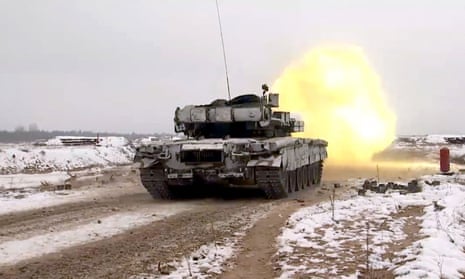Russia and Belarus have expanded their joint military training exercises in Belarus, the country’s defence TV channel said on Sunday, as concern grows that Moscow is pressuring its closest ally to join the war in Ukraine.
The two countries added weapons, soldiers and specialised equipment to the exercises and were doing drills drawing on Russian experience in Ukraine, Reuters reported.
On Friday the Belarusian leader, Alexander Lukashenko, visited a military base where Russian troops are stationed to meet troops and discuss the joint military drills.
Unofficial Telegram channels monitoring military activity in Belarus reported that between 1,400 and 1,600 Russian troops arrived in the city of Vitebsk, in north-east Belarus, on Sunday. Reuters said it could not independently verify the information.
A unilateral Russian ceasefire – announced for the Orthodox Christmas celebrations – drew to an end on Sunday but there had been little letup in fighting or civilian deaths during the period.
In the final hours when Russia was meant to be holding off fire, at least two people were killed by shelling, one in northern Kharkiv and another in Soledar, eastern Donetsk, Ukrainian officials said.
Moscow claimed without evidence on Sunday that it had killed 600 Ukrainian soldiers in a strike on the eastern town of Kramatorsk, near the frontline in Bakhmut, in revenge for an attack by Ukraine on new year’s day that killed hundreds of Russian fighters in the town of Makiivka. Ukraine dismissed the claim as propaganda and reporters for Reuters who visited the scene said there was no obvious sign of casualties.
Overnight temperatures are falling well below freezing across Ukraine, which could pave the way for more intense fighting as it becomes easier to move heavy machinery that would have become bogged down in autumn mud.
Fears of a new military push from the north will increase. Lukashenko has said he will not join the war, but his territory was used as a launchpad for the failed push for Kyiv last year, and Ukrainian authorities say it is still used as a base for drone and missile attacks.
In late December, Vladimir Putin made a rare visit to the Belarusian capital, Minsk. The Russian leader meets regularly with Lukashenko, but usually closer to home.
The trip was the first time Putin had been to Belarus since 2019, and raised fears he was pushing for military help with the war in Ukraine, where Russia’s army has suffered a string of humiliating defeats and is locked into grinding trench warfare.
Many in Ukraine and beyond have warned that Putin is considering a second attempt on Kyiv, following the pattern of last year’s invasion from the north, although the borders are now much more heavily fortified.
Ukraine’s military intelligence has claimed Russia is set to order the mobilisation of as many as 500,000 conscripts in January in addition to the 300,000 it called up in October, in another apparent sign that Putin has no intention of ending the war.
In December, Ukraine’s minister of defence, Oleksii Reznikov, and the army commander, Valeriy Zaluzhnyi, said Russia would attack from Belarus again this coming February, aiming for Kyiv. However, Ukraine’s military intelligence said it believed the possibility of an attack from Belarus was low.
Last week a senior Belarus military official said the joint Russian-Belarusian military force was being deployed as a “strategic deterrence”, the country’s Belta news agency reported.
“[It] is probably supposed to cool off hotheads of the west with its aggressive policy towards the Union State of Belarus and Russia,” Belta quoted Aleksandr Volfovich, the state secretary of the security council of Belarus, as saying.
